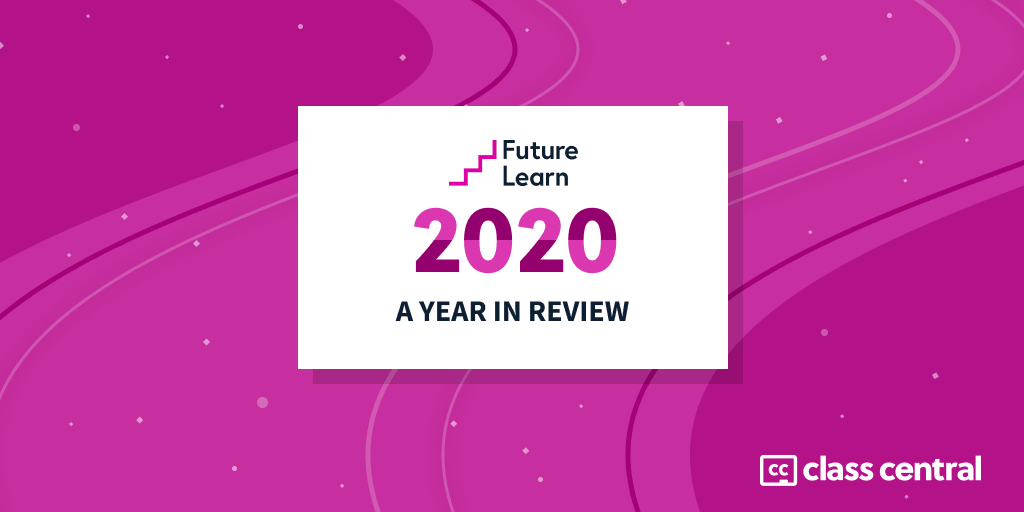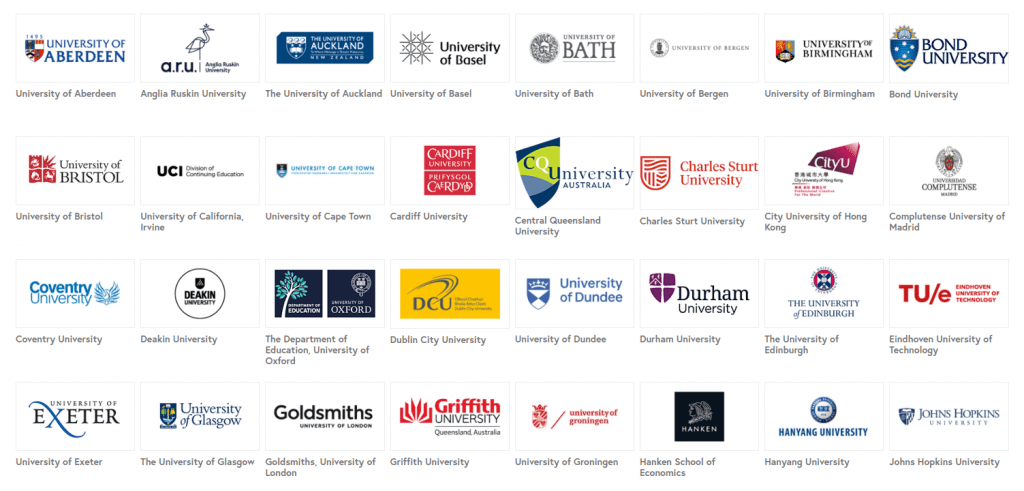FutureLearn’s 2020: Year in Review
In 2020, FutureLearn’s user base increased by 50% to reach 15 million learners worldwide.

Boosted by the pandemic, like other MOOC providers, FutureLearn has now over 15 million learners in 2020, up from 10 million in 2019.
FutureLearn’s founding CEO Simon Nelson stepped down, and the company introduced its first courses under the European Common Microcredential Framework (CMF), which carry academic credit.
For Class Central‘s complete analysis of FutureLearn’s 2020, keep reading. For our previous years’ analyses, follow the links:
- FutureLearn’s 2019: Year in Review
- FutureLearn’s 2018: Year in Review
- FutureLearn’s 2017: Year in Review
- FutureLearn’s 2016: Year in Review
By the Numbers
| 2017 | 2018 | 2019 | 2020 | |
| Courses1 | 578 | 736 | 883 | 1,158 |
| Microcredentials/Programs | 13 | 22 | 35 | 68 |
| Academic Certificates2 | 7 | 14 | 17 | 18 |
| Degrees 2 | 4 | 18 | 23 | 28 |
| Learners | 7.1M | 8.7M | 10.0M | 15M |
Early in 2020, FutureLearn launched several courses offering credit under the European Common Microcredentials Framework (CMF). While FutureLearn continues to release free courses without certificates, their catalog of paid microcredentials and degrees is also increasing. While some taster courses are available for free, there is no free audit option for most of the courses that make up degrees and for-credit microcredentials.
Courses
The number of active courses on the platform increased to 1158 (up from 883 last year). Data collected by Class Central shows that FutureLearn launched 233 new courses in 2020.
Below, you can see FutureLearn’s top ten courses launched in 2020, in terms of enrollments. Despite only launching this year, COVID-19: Tackling the Novel Coronavirus even became one of FutureLearn’s all-time top-20 courses. It’s no surprise that courses about COVID-19 and mental health feature prominently in the 2020 list.
Class Central’s Report compiled a list of the 100 most popular courses launched in 2020.
While the most popular courses were identified by looking at enrollment numbers, Class Central’s list of The Best Online Courses of All-Time was compiled by taking learners’ ratings into account. 39 FutureLearn courses made it onto the 2020 list.
Microcredentials
The number of microcredentials and programs has ballooned from 35 in 2019 to 68 in late 2020.
Unlike most single FutureLearn courses and programs, microcredentials do not have a free audit option and learners need to apply to join. They are not included in FutureLearn Unlimited.
Although not complete university qualifications, some microcredentials are eligible for credits under the European Common Microcredential Framework and can confer credit towards a degree. Check the FutureLearn pages for details.
In 2020, the number of microcredentials with university credit has risen from 3 to 30 (6 undergraduate and 24 postgraduate). Credits are offered by the university providing the course and students who want to transfer the credit over to a different university are advised to consult their university for recognition of prior study.
Two further microcredentials offer a certificate but not academic credit.
Programs
Generally, courses that make up FutureLearn Programs can be audited for free but you need to pay or join FutureLearn Unlimited to receive a certificate for individual courses. The final assessment for a program involves a separate fee: “Passing the final assessment unlocks the academic or professional recognition associated with completing an entire FutureLearn program, plus a FutureLearn Award.” Some programs confer credit if you want to apply for further study at the university offering the program.
36 programs are listed, up from 32 in 2019, although not all courses are currently open for enrollment.
Academic Certificates
FutureLearn currently offers one postgraduate diploma and 17 graduate/postgraduate certificates, one fewer than last year. To be eligible to apply, learners need to already hold an undergraduate (bachelor’s) degree.
FutureLearn Online Degrees
Some taster courses can be audited for free, but learners need to apply to become an enrolled student and pay the cost before accessing degree courses.
One degree mentioned last year (Cyber Security Masters from Deakin University) appears to have been dropped from FutureLearn. At AUD $35,000, it was the most expensive degree listed in 2019.
Most degrees have increased slightly in cost (for example, Coventry University’s MSc Nursing has increased from £14,000 in 2019 to £14,700).
| Degree Name | University | Degree Type | Cost |
| BA Management and Leadership [+] | Coventry University | Bachelors | £9,250 per year (UK/EU students)
£13,900 per year (International students) |
| BSc Quantity Surveying and Commercial Management [+] | Coventry University | Bachelors | N/A |
| Bachelor of Arts | University of Newcastle (Australia) | Bachelors | N/A |
| BA in International Business (Top Up) | Coventry University | Bachelors | £9,250 (UK/EU students)
£13,900 (International students) |
| MA Management (Advanced Standing) [+] | Coventry University | Masters | £4,600 |
| MBA International Human Resource Management [+] | Coventry University | Masters | £15,450 GBP |
| MSc Mental Health [+] | Anglia Ruskin University | Masters | £7035 GBP |
| MSc Child and Adolescent Mental Wellbeing [+] | Anglia Ruskin University | Masters | £7035 GBP |
| Masters Degree Digital Learning Leadership | Deakin University | Masters | $14,850 AUD |
| Masters Degree in Information Technology | Deakin University | Masters | $19,150 AUD |
| Masters Degree in Leadership | Deakin University | Masters | $19,450 AUD |
| Master of Business Administration | Coventry University | Masters | £17,550 GBP |
| MSc Business and Organisational Psychology | Coventry University | Masters | £14,700 GBP |
| MSc Construction Management with BIM | Coventry University | Masters | £16,600 GBP |
| MSc Construction Project and Cost Management | Coventry University | Masters | £16,600 GBP |
| MSc Cyber Security | Coventry University | Masters | £16,600 GBP |
| MSc Disaster Management and Resilience | Coventry University | Masters | £14,700 GBP |
| MSc Emergency Management and Resilience | Coventry University | Masters | £14,700 GBP |
| MSc End of Life Studies | University of Glasgow | Masters | £11,800 GBP |
| MSc Global Logistics | Coventry University | Masters | £16,600 GBP |
| MSc Nursing | Coventry University | Masters | £14,700 GBP |
| MSc Project Management | Anglia Ruskin University | Masters | £7035 GBP |
| Masters Degree in Sustainable Development and Humanitarian Action | Deakin University | Masters | $12,400 AUD |
| Master of Business Administration (Artificial Intelligence) | Coventry University | Masters | £17,550 GBP |
| Master of Business Administration (Cyber Security Management) | Coventry University | Masters | £17,550 GBP |
| Master of Business Administration (Health Care Sector) | Coventry University | Masters | £17,550 GBP |
| Master of Business Administration (Sustainable Tourism) | Coventry University | Masters | £17,550 GBP |
| Master of Business Administration (Marketing) | Coventry University | Masters | £17,550 GBP |
| Cyber Security [-] | Deakin | Masters | Not available |
FutureLearn Partners

FutureLearn currently lists 91 university partners as well as 75 specialist organizations such as the British Council and Amnesty International. 5 Centres of Excellence and 31 Associate Partners are also listed.
As a UK-based platform, FutureLearn partners with many British and Australian universities. But some institutions from across Europe, the US, and some other countries are also featured.
Pandemic Response & Impact
Like other MOOC providers, FutureLearn greatly increased its numbers of learners during the COVID-19 pandemic. Some courses offered upgrades, which include certificates, for free.
In May, FutureLearn Schools was introduced, offering school students aged 13 and over free upgrades to hundreds of courses until September 2020. FutureLearn Campus allowed students and staff of partner universities to upgrade courses for free, also until the end of September.
FutureLearn CEO to Step Down
In July, inaugural CEO Simon Nelson announced his resignation, effective at the end of 2020. His successor has not yet been announced.
[1] The numbers represent the total number of courses offered in that particular year.
[2] Graduate and Postgraduate Certificates and Diplomas are listed under academic certificates, not under degrees.





